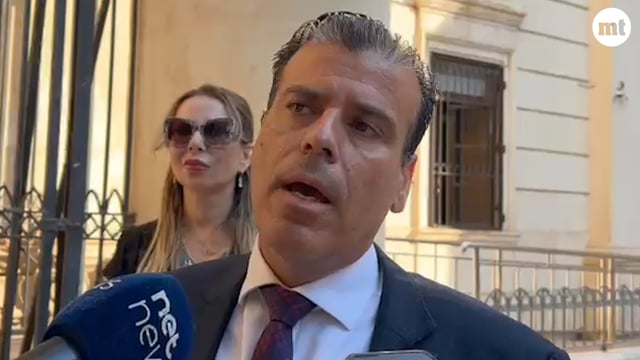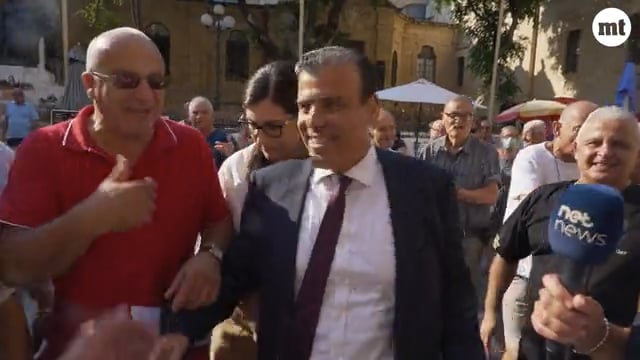Fredrick Azzopardi lawyers ask for magistrate's recusal, claim charges time-barred and extinct
The former Infrastructure Malta CEO is charged with violating environmental protection legislation and ignoring the ERA's orders to stop works in Wied Qirda


Former Infrastructure Malta CEO Frederick Azzopardi has requested the recusal of the magistrate tasked with hearing the criminal case filed against him over breaches of environmental protection legislation, on the grounds that the same magistrate had already pronounced herself in a closely-related case, also arguing that the charges were time-barred.
Azzopardi appeared in court early this morning to face criminal charges of having violated environmental protection legislation in 2019, when he allegedly ignored a stop-and-comply order issued by a governmental authority and ordered a contractor to continue with road building works in Zebbug’s Wied Qirda.
The sitting, which was presided over by magistrate Elaine Mercieca took place in Hall 22, the largest courtroom in the building, which is normally used by the Criminal Court.
Inspector Elliott Magro from the police force’s Environment Protection Unit is prosecuting the case, over Infrastructure Malta’s defiance of a stop and compliance order issued by the Environment and Resources Authority (ERA).

Azzopardi, the road building agency’s ex-boss has been charged with ordering contractor Anthony Camilleri of AC Group to continue with works in the valley, despite having been ordered to stop by the environmental watchdog.
In a judgement imposing a €36,000 fine on Camilleri which was handed down by magistrate Elaine Mercieca last April, the court had declared that Infrastructure Malta had disregarded the stop-and-comply order issued by ERA by ordering its contractor to continue with the road works.
That court had been told how the contractor was receiving orders from Infrastructure Malta, specifically from its former CEO Fredrick Azzopardi and architect David Vassallo. Azzopardi had insisted during the hearing of that case that the works were necessary to ensure the safety of the public road and that he thought the stop order meant that no work could be done apart from that related to the strengthening of the road.
Infrastructure Malta’s works, intended to reinforce a road leading to a private residence in the ecologically sensitive area, had resulted in considerable environmental damage in the valley, including the uprooting of protected trees and the destruction of other natural habitats.
In January 2020, politician Arnold Cassola had filed a criminal complaint with the police asking them to investigate and prosecute Azzopardi over the works, saying they did not have a permit, in addition to the ignored stop notice. When no action was taken by the police, Cassola then filed a further complaint with the Professional Standards Board, over the police’s inaction against Azzopardi, the agency’s CEO at the time.
In comments published by the Times of Malta before his arraignment, Azzopardi had expressed confidence that he would be acquitted, claiming that the works had been urgently required as the existing road had been unsafe.
Azzopardi, a key ally of former infrastructure minister Ian Borg, had relinquished his post as head of Infrastructure Malta in April after four years in the role, the resignation coinciding with Borg’s move to the foreign ministry. He now works in the private sector.
Inspector Eliott Magro is prosecuting, whilst lawyers Stefano Filletti, Steven Tonna Lowell, Rachel Powell and Ana Thomas are defence counsel to Azzopardi.
When the case was called this morning, the defence summoned Graziella Tabone from ERA, to testify in support of its arguments.
Tonna Lowell asked the witness about a letter from ERA, which the defence exhibited. She had no knowledge of the letter, she said. She could not confirm that the fine had been paid and did not know who could confirm.
Tabone said she was an environmental protection officer, so she would know about fines but would not be involved in them. This was for her superiors.
The lawyer argued that the illegality lasted less than three months and the fine has been paid, meaning that the action is doubly extinct.
Tonna Lowell asked that the next step be for ERA to be asked to send someone to testify about the letter. The court ordered Amy Brincat, the director of Enforcement at ERA, to testify about the letter she sent on 24 March 2022 as well as about whether the fine had been paid and when the works in question had stopped.
The court suggested it move on to start hearing witnesses, at which point Tonna Lowell stated that the defence would be asking for the magistrate’s recusal. Tonna Lowell explained that the court had already decided the same merits of this case in its decision against Camilleri.
Filletti added that it was an established principle in criminal justice that the person judging a criminal case be tabula rasa (clean slate) arguing that even the symbol of justice was blindfolded. He had no concerns about the court’s competence or integrity, but the fact that the court had already formed a legal opinion on facts which are identical. "Therefore we don’t have a tabula rasa before us today," he said.
It is in this spirit that the defence was submitting the request for recusal, said Filletti, adding that the preliminary pleas of prescription and extinction of the action did not deal with the merits of the case, and so could be decided by the magistrate.
The sitting was adjourned till 27 September for a decree on the recusal request.







.jpg)





.jpg)






.png)

